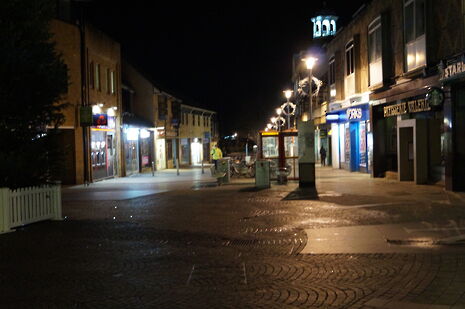Helping the homeless?
Olivia Lam on why we shouldn’t be so quick to judge when it comes to homeless people

Homeless people are a ubiquitous feature of Cambridge. You see them so frequently that sometimes you just walk right past them without noticing. Although they are a voiceless and often ignored group of the community, I have already heard so much about homeless in Cambridge during my first term here. Comments range from “they are not even from Cambridge. They just came here for naive students like you,” and “the dog they have is a trick! I have seen the same dog with a few people” to “why don’t they just apply for welfare and find a job?”.
In the beginning I bought the narrative. I thought that there must be better and more systematic ways to help them, such as donating to charities, volunteering or policy advocacy. As clichéd as it might sound, it was not until I watched the movie I, Daniel Blake that I started becoming more aware that the story behind each homeless person is much more complex than that – they are not just a homogeneous single entity called ‘homeless people’. They are first and foremost individuals who have somehow ended up on the streets due to a series of events.
"But who are we to judge whether someone deserves to sleep in the cold with an empty stomach tonight based on their disposition?"
What those who warned me about the homeless did not realise was that each of their complaints reflects a specific set of problems in how society treats the homeless. If the homeless have to move to another town where people are more generous in order to survive, one can imagine how indifferent people must have been where they are from.
What disgusts me more is that having a dog can help the homeless person receive more money. Has our society become one that sympathises with dogs more than humans? It is true that there are benefits available to the homeless, but watching I, Daniel Blake reminded me that the welfare system is ultimately just a big bureaucracy. It is marked by inflexible rules, which require stringent procedures to change.
This system labels people and attempts to put their problems into boxes. Homeless individuals become data entries on a spreadsheet, points on the graph, and faceless names in emails. The system cannot deal with each case flexibly, but we can. These people that are left behind by the system are sleeping on the streets now, outside Sainsbury’s, Cindies, your college, and you can talk to and help each of them individually. We are the last line of defence.
The notion that some homeless people do not deserve our generosity because they are dishonest in their approach (such as sharing the same dog among a few of them) is patronising. We think we can divide poor people into ‘good’ poor people and ‘bad’ poor people. The good poor people use the money they get wisely, look for jobs actively and say “May God bless you” when you give them money. The bad poor people use dogs as props, the money they get to buy alcohol or cigarettes, and are too chatty. But who are we to judge whether someone deserves to sleep in the cold with an empty stomach tonight based on their disposition?
When you pay tax to fund the NHS, you would never ask whether the people benefitting from your tax money are of a good nature, so why does it make a difference when you see someone vulnerable in person? Perhaps that is why people sympathise with dogs more than humans. Dogs are innocent: they could not have made any mistakes for them to end up on the streets. Homeless people could be criminals, drug addicts, alcoholics. They might not deserve your £1.
Equally, then, we should be reminded not to demonise people who do not give money. Same as the homeless, they are not a single entity. They all have reasons behind their actions and inactions. Try this. From now on, see every pound you give to the homeless as a bit of wealth redistribution – or if it is too socialist for you, a bit of taxation. This is the least we can do
 News / Cambridge academics sign open letter criticising research funding changes22 February 2026
News / Cambridge academics sign open letter criticising research funding changes22 February 2026 News / Supporters protest potential vet school closure22 February 2026
News / Supporters protest potential vet school closure22 February 2026 News / University Council rescinds University Centre membership20 February 2026
News / University Council rescinds University Centre membership20 February 2026 News / Hundreds of Cambridge academics demand vote on fate of vet course20 February 2026
News / Hundreds of Cambridge academics demand vote on fate of vet course20 February 2026 News / Union cancels event with Sri Lankan politician after Tamil societies express ‘profound outrage’20 February 2026
News / Union cancels event with Sri Lankan politician after Tamil societies express ‘profound outrage’20 February 2026









